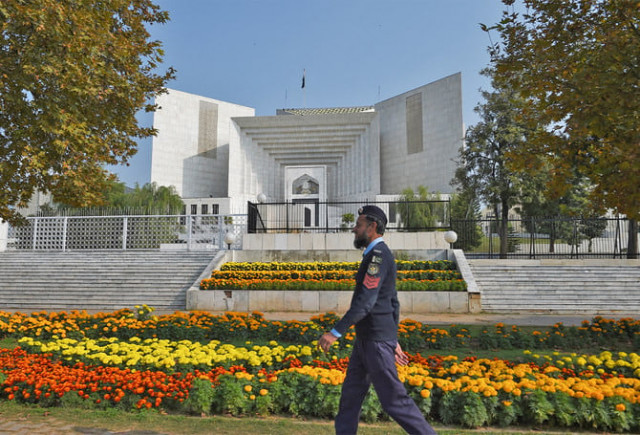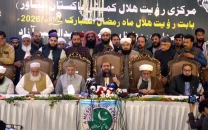Judiciary ‘can’t assume role of lawmakers'
Two SC judges express their dissenting opinions on SC majority verdict on Article 63-A

Supreme Court’s Justice Jamal Khan Mandokhail has observed that judges had no authority to assume the role of the parliamentarians and to replace their wisdom by amending the Constitution – while expressing his dissenting opinion on the majority decision on the interpretation and scope of Article 63-A.
He added that judges while interpreting any provisions of the Constitution should limit themselves to a fair reading of its words and the intention of its framer, and no more.
“Otherwise, judges enter the realm of creating, not just interpreting the Constitution.”
Similarly, another top court Judge Justice Mazhar Alam Miankhel has said that answering any question, mentioned in the presidential reference on the scope and interpretation of Article 63-A of the Constitution, in the affirmative would lead the Supreme Court to exceed and overstep its domain.
Both judges have issued their dissenting opinions separately on the majority decision of the SC.
“The wordings of Article 63-A are clear enough and free from any doubt to judge the intent of the Constitution’s framers. Thus it needs no further interpretation,” Justice Miankhel noted.
The judge further observed that the questions posed by the president through the reference were of political nature. “Therefore, the same cannot be replied to in a manner proposed by him. In view of the principle of trichotomy of powers, in my opinion, it is not desirable for this court to engage itself in resolving sensitive political issues.”
Justice Miankhel noted that in order to eliminate this menace of malicious floor-crossing, it would be appropriate to know the causes and circumstances of defection by a member.
“Our democracy has been interrupted several times by unconstitutional forces via the imposition of martial laws on the pretext and through the arranged campaigns, to portray all the parliamentarians as corrupt in order to give justification to the unconstitutional acts,” he added.
"The reputation of the politicians has been damaged by labeling them as corrupt without due process and a declaration from a competent court of law, despite the fact that most of them enjoy the good character and they are men of principle. Some members are compelled to change their loyalties without their free will and against the conscience for unknown reasons, which is one of the causes of malicious floor-crossing. Because of unconstitutional interruptions in the democratic system, our country has already suffered great loss and ultimately had an enormous negative impact on its prosperity, economic and democratic progress. Admittedly, there is a difference of opinion amongst the political parties and their parliamentary members with regard to the consequences of floor crossing, therefore, it is the authority of the parliamentarians, who may reconsider the consequences of defection, on the touchstone of morality and ill-intention of members.”
Justice Miankhel further observed that the president could have expressed his reservations and suggested proposals before parliament during his annual speech or otherwise could have had a meeting with the heads of the political parties and parliamentary party leaders, for deliberations about his concerns regarding malicious floor-crossing.
"Instead, he [the president] preferred the reference, after almost more than a year of the Senate elections and that too, on the eve of proposed resolution of no-confidence against the PM. The attempt of the president to get the desired interpretation is not free from doubt. He still has the authority to indulge with the parliamentarians and party heads to unearth the causes of the defection of a member for unknown reasons and to suggest measures in order to eliminate the malicious floor crossing.”
The SC judge in his dissenting note observed that it was now high time for all the stakeholders to think and realise the welfare of the people, continuity of the process of democracy, the sovereignty of parliament, and prosperity of the country, strictly within the parameters of the Constitution. “Ultimately, the members will acquire political acumen, resultantly, the frequent malicious floor-crossing could conveniently be eliminated to a great extent.”
In his separate dissenting note, Justice Miankhel noted that he kept on waiting for the majority judgment by Chief Justice of Pakistan Umar Ata Bandial, Justice Ijaz ul Ahsan and Munib Akhtar, but it had not been delivered to date.
“I am going to be superannuated on July 13, 2022; therefore, I decided to release my judgment [dissenting note] comprising reasons in support of my short order dated May 17, 2022," the judge wrote at the start.
The judge noted that Article 63-A after the 18th Amendment was very much there and the legislature after that had never deemed it appropriate to go for further amendments to it.
"All the questions referred to this Court, with the cumulative effect, are of the type that answers to any question in affirmative would lead this Court to exceed and overstep its domain. This in other words would mean that this Court is putting something new in the text of the article which is not even the mandate of the Constitution,” he added.
Justice Miankhel observed that the argument that defection or horse trading was a cancer and “we have to eradicate the same by curbing it with an iron hand”.
“I may agree to [a] certain extent with this proposition but this menace could not be curbed by the stroke of my pen. Again, it is for the Constitution makers to remove this cancerous tumor through a surgical operation. To me, the entire provision of Article 63-A as reproduced above is very plain and simple and I find nothing which could hardly need any interpretation other than what its language provides. In my view, it’s a complete code in itself [that] provides a comprehensive procedure regarding defection of a member of parliament. It does not admit interpretation and as such the questions asked through this presidential reference are answered in negative. However, if parliament deems fit or appropriate may impose further bar or restriction upon the defectors.”



















COMMENTS
Comments are moderated and generally will be posted if they are on-topic and not abusive.
For more information, please see our Comments FAQ